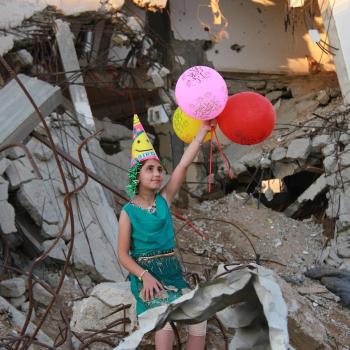 I met my first Iraqi Christian just two weeks ago. She was a nun, her face lined with age and concern. She grasped my hand, prayed for me, and expressed profound sorrow for the state of her nation and for the horror and pain of my experience in war. She'd heard me speak about my experience "downrange" and wanted to assure me that the Iraqi people were not evil, that they longed to be free.
I met my first Iraqi Christian just two weeks ago. She was a nun, her face lined with age and concern. She grasped my hand, prayed for me, and expressed profound sorrow for the state of her nation and for the horror and pain of my experience in war. She'd heard me speak about my experience "downrange" and wanted to assure me that the Iraqi people were not evil, that they longed to be free.
Her faith and love were overpowering, and her story moved me. A refugee of the unspeakable violence in Iraq, she had traveled back—more than once—to pray with and minister not just to her own people but also to the American soldiers at the epicenter of the bloody battle for her country's future. If Iraqi Christians are like this, I thought, there is hope yet.
But she lives here in the United States now, like so many of her brothers and sisters. What was once one of the Middle East's largest Christian communities is being driven from the country. By some accounts, Iraq has lost nearly half its pre-war population of 1.4 million Christians. Despised by Muslim radicals on all sides of Iraq's sectarian conflicts, they've been caught in the crossfire, and now they're leaving.
Are Egypt's Coptic Christians next? Radicals bomb their churches, and the revolution brings as much fear as hope. Will the Muslim Brotherhood take charge? Even if it doesn't, will a new government risk any of its precious political capital to protect the embattled Christian minority? Will the world community care?
If history is any guide, the Christian future in the Middle East is grim, and the world will look the other way. How do we know this? Because they've already come for the Jews, and no one cared.
It is, sadly, a little-known fact that almost a million Jews lived in Arab countries when Israel declared independence in 1948. Now, there are less than 10,000. To take a few examples, 250,000 lived in Morocco, 140,000 in Iraq, 80,000 in Egypt, 140,000 in Algeria, and roughly 50,000 in Yemen. But now? 3,000 in Morocco, 100 in Iraq, 100 in Egypt, none in Algeria, and only a few hundred in Yemen. This isethnic cleansing on a grand scale.
Jews were shot, homes were burned (sometimes in front of cheering crowds), and governments confiscated their property. Anti-Semitic mobs surged through streets, and the Jews fled, often airlifted to Israel as they left the homes of their fathers (and their fathers' fathers) behind.
These refugees often lived in tents as they struggled to rebuild their lives in their adopted, embattled home. That they ultimately succeeded in building a prosperous democracy does not wash away the sin of their persecution and expulsion.
Yet who remembers their story? Israel does, to be sure. But do our leaders? As we seek to engage the Muslim world, do we understand its recent history? When our own Director of National Intelligence ludicrously calls the Muslim Brotherhood "largely secular," the Obama administration is sending a strong signal that it cannot comprehend the present, much less the recent historical past.
Deprived of historical perspective, we look at the problems of the Middle East as the work of a "few extremists" and minimize the profound sickness at the heart of much of Arab and Muslim culture. The ethnic cleansings of the past (Jews) and present (Christians) are not the work of a tiny few, and the mobs that burned the Jews out of their homes in the 1950s, 1960s, and 1970s gave birth to the children who burn with hate today.
While there are aspects of the Egyptian and Iranian uprisings that give me hope, I can't help but feel that we're watching the revolution of one brand of anti-Semitism and anti-Christian radicalism against another, and that even democratic change—while positive in some respects—simply won't address the evil of hatred and prejudice that lurks in all too many Middle Eastern hearts.
The so-called "international community" professes to abhor racism and discrimination, yet some forms of racism are apparently less abhorrent than others, and some forms of religious discrimination more outrageous. Arab nations ethnically cleansed hundreds of thousands of Jews less than one generation after the Holocaust, and the world yawned.
Now the cleansing extends to Christians, and the international community yawns again. We should not be surprised at its indifference.
2/7/2011 5:00:00 AM





